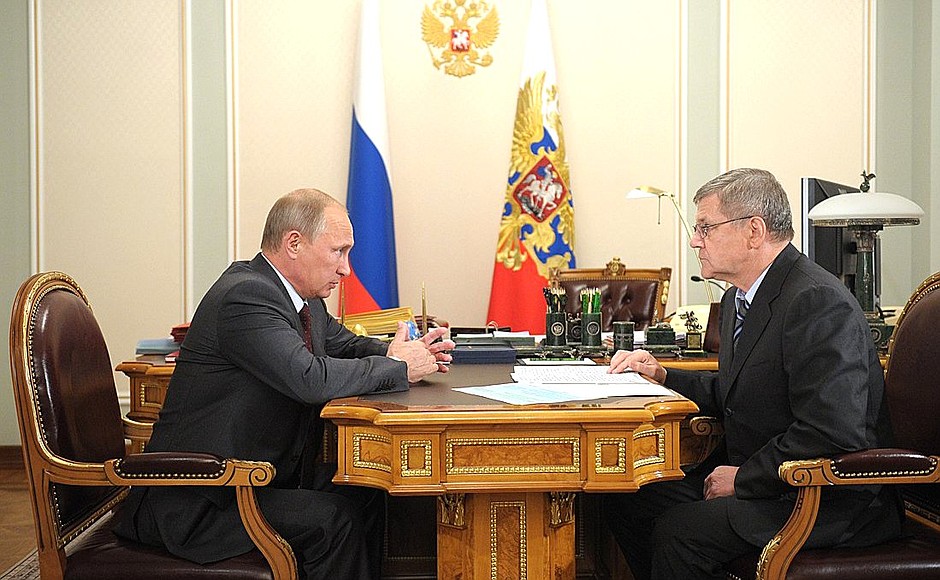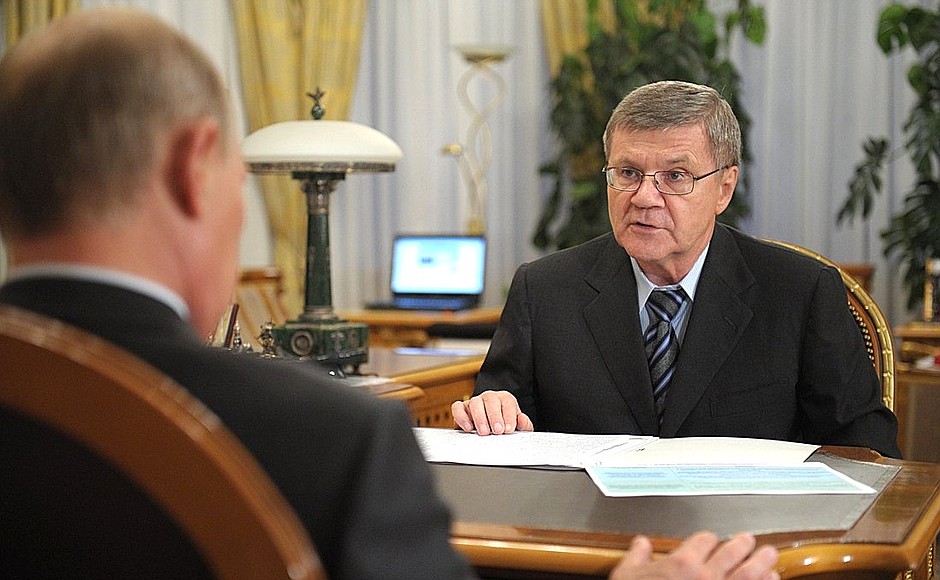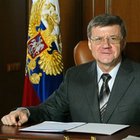President of Russia Vladimir Putin: Mr Chaika, I asked you a while back to have the Prosecutor General’s Office take a look at what is happening with implementation of state defence procurement contracts. I know that you have done a lot of work and put together the relevant documents. I want to discuss this with you now.
Prosecutor General Yury Chaika: Mr President, yes, it was exactly a year ago now that you asked me to organise a special inspection of the situation in the defence industry and the implementation of state defence contracts. Over this time, we have conducted checks at shipbuilding and aircraft manufacturing corporations, at the holdings Russian Helicopters and Sukhoi and at their subsidiaries – more than 100 defence industry companies in all.
Since the start of this year, we have uncovered evidence of more than 7,000 violations of the law, brought disciplinary penalties against more than 800 offenders, opened 300 cases for administrative violations and 131 criminal cases. The total damages come to more than 20 billion rubles [more than $500 million]. But, laying these figures aside for a moment, the important thing to note here is that the measures taken together with the Defence Ministry, Ministry of Industry and Trade, and the Government Military-Industrial Commission (we held a joint meeting on the matter with these three ministries) have not only improved the quality of military goods produced but in a number of cases have nearly halved the costs and in some cases have even more than halved the costs.
For example, according to Defence Ministry statistics, the cost of one small tanker dropped by more than 500 million rubles over the last year, and the cost of one satellite decreased by more than 380 million rubles. Seven arms contracts saw their costs come down by nearly 2 billion rubles. At the same time, timeframes for executing defence procurement contracts have also shortened substantially. In some cases companies are completing the work ahead of deadline, which was something hard to imagine earlier. Russian Helicopters, for example, delivered 26 helicopters to the Defence Ministry, Federal Security Service and Interior Ministry in 2013, though the contract deadline was for 2014. This would have been hard to imagine in the past.
The inspections resulted in the closure of more than ten fly-by-night firms that were transferring money abroad, and 30-odd intermediary firms that were operating in breach of the prohibition imposed by the Presidential Executive Order. Discipline with regard to carrying out defence procurement contracts has been strengthened and we have ended the use of shadow schemes designed to steal budget funds, send assets to offshores and deliberately bankrupt big defence companies.
I reported to you earlier on the bankruptcy proceedings underway against Amur Shipbuilding Plant. We set about actively investigating that situation. This company produces corvette-class ships. In December 2011, it had debts of 16 billion rubles and was in the middle of bankruptcy proceedings initiated by United Shipbuilding Company, though the state authorities were giving up 4 billion rubles a year in state support to help get this company back on its feet. The measures taken this year made it possible for the court to halt the bankruptcy proceedings. The plant is now developing well, has increased its assets, taken on 250 more workers, and is getting new orders.
The Prosecutor General’s Office’s intervention has made it possible to start fixing up the gaps and oversights in these corporations’ internal legal regulations. Mr President, their internal rules and regulations were in a dreadful state. The United Aircraft Manufacturing Corporation alone is drafting and bringing into line with current legislation more than 120 rules and regulations. Paradoxical as it might seem, they had been working without this legal base.
We are continuing efforts to ensure compliance with the law in the defence industry. Together with the three ministries, we are working on the basis of a joint action plan and have set up a joint working group responsible for compulsory monitoring of the situation and organising inspections, including in response to new information received. In other words, we are getting help in our work from the Federal Security Service and the Interior Ministry.
We are currently investigating Almaz-Antey, a manufacturer of air defence systems. By the year’s end we also plan to inspect the Federal Directorate for Safe Storage and Destruction of Chemical Weapons, the company Radio-Technical and Information Systems and a number of other defence sector companies. We will keep you regularly updated on implementation of your instruction. Mr President, I think that we have done a lot of work this year and achieved some positive results.
Vladimir Putin: Thank you.
The criminal cases that have been opened must be examined very thoroughly. Everything must be investigated and all of these cases must be brought to their logical legal conclusion. In the cases that end up going to court, I ask you to support the relevant charges and comply with the required regulations. As for the inspections, this work certainly needs to continue.
Thank you.
<…>


